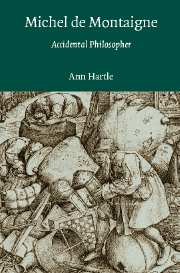Book contents
- Frontmatter
- Contents
- Acknowledgments
- Note on the Texts
- Introduction
- PART I A NEW FIGURE
- PART II ACCIDENTAL PHILOSOPHY
- 4 The Circular Dialectic of Self-Knowledge
- 5 “What It Means to Believe”
- 6 The Latent Metaphysics of Accidental Philosophy
- PART III THE CHARACTER OF THE ACCIDENTAL PHILOSOPHER
- Notes
- Works Cited
- Index
4 - The Circular Dialectic of Self-Knowledge
Published online by Cambridge University Press: 23 July 2009
- Frontmatter
- Contents
- Acknowledgments
- Note on the Texts
- Introduction
- PART I A NEW FIGURE
- PART II ACCIDENTAL PHILOSOPHY
- 4 The Circular Dialectic of Self-Knowledge
- 5 “What It Means to Believe”
- 6 The Latent Metaphysics of Accidental Philosophy
- PART III THE CHARACTER OF THE ACCIDENTAL PHILOSOPHER
- Notes
- Works Cited
- Index
Summary
Accidental philosophy is a form of dialectic. The dialectical movement of accidental philosophy is not, however, an ascent from opinion to knowledge; it is rather a circular movement in which thought returns to its beginnings and thus possesses those beginnings in a new way. Thought no longer simply presumes its starting points. What makes this circular movement dialectical is the reconciliation of opposites that takes place in the course of departure and return and the change that is brought about in the accidental philosopher himself. Each moment of the dialectical movement is preserved in the return to the beginnings. What makes this circular dialectic philosophical is the discovery that truth can only be found in the beginnings: we can only come to understand what we already somehow understand, and we can only see the truth that was already there.
In this chapter I first set out the circular movement of Montaigne's thought by considering several of the essays in which that movement seems especially clear and by tracing out the circular path that includes the first essay of each of the three books of the Essays. (The dialectic of the “Apology” is taken up in Chapter 5.) A contrast is drawn between Montaigne's circular dialectic and skepticism. I then show how the circular dialectic is Montaigne's way of thinking within the pervasive and inescapable human condition of presumption, “our first and original malady,” which allows us to recognize and make sense of the change in Montaigne's own being that turns him away from deliberate philosophy and to his own accidental philosophy.
- Type
- Chapter
- Information
- Michel de MontaigneAccidental Philosopher, pp. 91 - 120Publisher: Cambridge University PressPrint publication year: 2003

